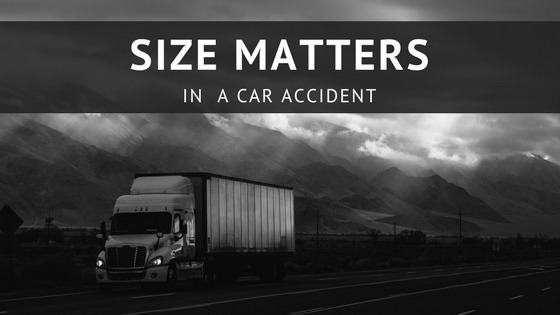Car Accidents Involving Big Trucks – Vehicle Size Correlates to Damage and Injuries
It’s a commonly held belief that driving a large vehicle keeps you safer in the event of a car accident. Are trucks and SUVs really safer than a compact or mid-size car?
According to the Centers for Disease Control and Prevention, Americans spent 1 million days in the hospital due to accidents in motor vehicles in 2012. Furthermore, the lifetime medical costs for those accidents totaled $12 billion.
The size of your vehicle and its class can make the difference between a minor accident and a major one. Larger, late-model vehicles protect passengers in crashes better than smaller ones. That’s because vehicle weight is a protective factor, according to the Insurance Institute for Highway Safety. This is true for compact cars and SUVs, with the latter, generally, providing the best protection for people in motor vehicles.
If you have been in an auto accident in the Dallas Fort Worth area and have been injured, it is important that you consult with a personal injury attorney. A knowledgeable accident attorney can arrange to properly document your claim. Car insurance companies often will not fairly handle a car accident claim in which there is low visible property damage. However, there can be hidden damages to your vehicle that an attorney can help document. It is very important that hidden damages be properly documented because the amount of money that the auto insurance companies often pays for personal injury is largely based upon the amount of physical damage to the vehicle.
SUVs provide superior safety in front-end crashes because their larger front means the area of impact and crushing is further from the passenger area of the vehicle as compared with the front-end of compact cars. This means there are fewer forces to injure occupants and they are less likely to be in the crushed area during an impact.
The NHTSA, which rates vehicles on how well riders survive crashes, notes that its crash tests are only valid within size classes. Therefore, a compact car with its top 5-star rating probably would not do well in a crash with an SUV with the same grade. However, the IIHS warns us not to think that a large, 10-year-old car is safer than a compact car of today. It explains that late-model cars of all sizes have better safety features than older cars due to more advanced systems and equipment such as side airbags and electronic stability control. The latter, which reduces the chances of rollovers, became standard in 2012. If you can buy a new car that’s equipped with the latest features, do so. If not, at least make sure your used car has the above-mentioned features.
Another factor contributing to the safety of SUVs is that because they are taller, they are not likely to slide under smaller vehicles, which is a risk for compact cars. Pickup trucks and SUVs, however, are more likely to be in single-vehicle crashes and to have rollover accidents. According to crash data, in front end-crashes, pickup trucks do not do much better than mid-size sedans.
One reason cars do not come out well in crashes with tractor-trailers, for example, is that trucks are taller and weigh 20 – 30 times more than they do. Also, many trucks have the well-known blindspot when it comes to seeing smaller vehicles near them.
Forbes online on January 3, 2018 said four-door micro-cars and mini-cars with passengers had more insurance claims than compact cars with four doors and midsize sedans. Large pickup trucks and large, luxury SUVs had the fewest claims.
The right vehicle helps protect you and your passengers. However, bad weather, habits such as drug and alcohol abuse and distracted driving can lead to accidents. If you are in a car crash, you need a car accident lawyer.
Call our law offices today at any of our convenient locations and get a free consultation.
Arlington (817) 522-4451
Denton (940) 222-4060
Dallas (972) 362-6848
Fort Worth (817) 764-1375
Cedar Hill (972) 338-9427
Plano (972) 354-4602
Lewisville (972) 354-4605
You can also contact us online by using our quick contact form.











